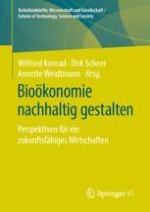2020 | OriginalPaper | Buchkapitel
4. Wissen für den Wandel – Wissenstheoretische Grundlagen einer nachhaltigen Bioökonomiepolitik
verfasst von : Sophie Urmetzer, Michael P. Schlaile, Kristina Bogner, Matthias Mueller, Andreas Pyka
Erschienen in: Bioökonomie nachhaltig gestalten
Verlag: Springer Fachmedien Wiesbaden
Aktivieren Sie unsere intelligente Suche, um passende Fachinhalte oder Patente zu finden.
Wählen Sie Textabschnitte aus um mit Künstlicher Intelligenz passenden Patente zu finden. powered by
Markieren Sie Textabschnitte, um KI-gestützt weitere passende Inhalte zu finden. powered by
